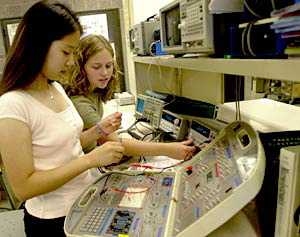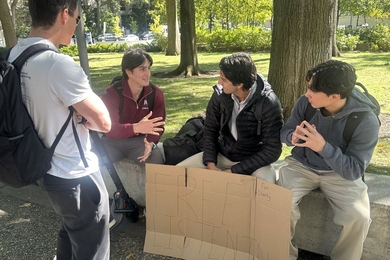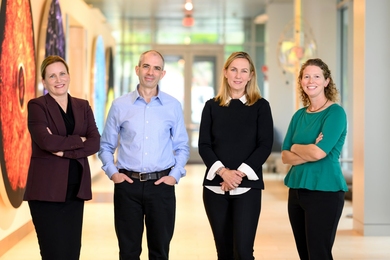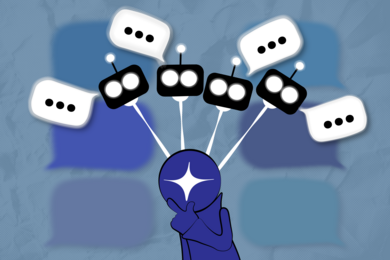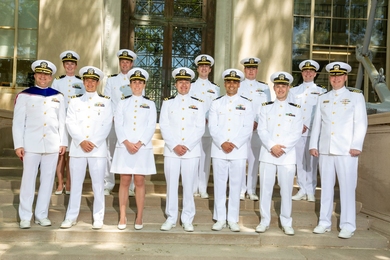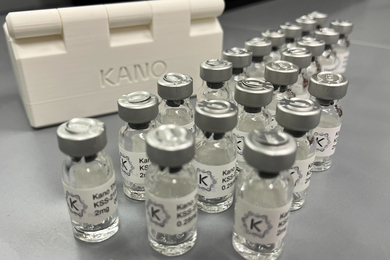Now and then, an ambitious graduate student will decide to tackle a particularly sticky problem in science or engineering. One such student, Douglas Ricket, created the Women's Technology Program as a partial solution to a tough problem with social rather than technical roots.
Ricket, a 23-year-old graduate student in electrical engineering and computer science, discovered a deeply entrenched difficulty in his field while teaching an electronics course for high school students. He came up against it again as a teaching assistant in an artificial intelligence course.
The problem: few women go into electrical engineering and computer science (EECS).
Women majoring in computer science peaked nationally in 1984 at 37 percent, but dropped to 28 percent by 1994. Last year at MIT, more than 40 percent of undergraduates were women, but women made up only 20 percent of EECS majors, which is the largest major at the Institute. By contrast, 52 percent of undergraduate men majored in EECS.
"Those two teaching experiences got me thinking about the issue of women in computers and engineering. I hated to think I was perpetuating a male-dominated system, so I drew up some plans for the program and got the ball rolling,"said Ricket, who added that women, long excluded from the professions, now make up roughly half of all medical and law students.
Ricket, who is from Saratoga, Calif., asked Professor Leslie Kaelbling of EECS to be faculty advisor for the innovative program last November. Next he got the approval of Professor John Guttag, head of the Department of Electrical Engineering and Computer Science. Guttag "enthusiastically supported the idea, though scaled down to 25 students for four weeks from my original 80 students for eight weeks," said Ricket. "I was delighted that he supported the residential aspect, since I think that creates a much richer experience."
The Women's Technology Program is the first of its kind. Ricket put together a summer program on the MIT campus to teach 10th-and 11th-grade girls math, computer science and electrical engineering in a way that conveys the excitement of the field and boosts the students' self-confidence in their technical abilities.
He looked at Carnegie Mellon's experience in addressing gender discrepancies in computer science. A study there found that computer programming experience in high school was not an indicator of success in college. Recognizing this, the school changed its computer science admissions criteria. It also changed the introductory computer science courses to help students who had no experience. The changes had a remarkable effect: the percentage of women in the Carnegie Mellon computer science department went from 7 percent in 1995 to 42 percent in 2000.
LOOKING FOR A FEW GOOD WOMEN
For the MIT summer program, Ricket received 225 applications. The 25 young women selected come from 15 states as well as Cairo, Egypt. In late June they moved into an MIT dormitory, where they'll live through most of July under the supervision of a graduate student residential director and five undergraduate teaching assistants. They will be taught by graduate students.
The young women immersed themselves in MIT right away.
In her first week on campus, Elena Glassman, a 15-year-old from Doylestown, Penn., said, "You're exposed to so much here. I just want to absorb a tiny bit of some of the stuff that goes on. I want to get ideas, to talk to the people doing this stuff and understand the breadth of AI [artificial intelligence]."
Glassman has been a frequent visitor to the Artificial Intelligence Lab's web site for several years. While browsing the MIT site, she found the Women's Technology Program and jumped at it.
She said her father, an electrical engineer, showed her the AI Lab's web site when she was in sixth grade trying to build a "cat brain" program that could "differentiate between a dog bark and a mouse squeak." (Glassman sounded embarrassed when describing the simple program: "Don't write about that. It was just a little thing for a science fair," she said.)
"Most of my science and math training comes from my dad. He worked in neural networks for speech. We have this policy we both agree on: he never tells me what to do. If I come to him with a question, he'll say, 'O.K. Let's talk about it.' And I eventually come to my own conclusions," she said.
Glassman, who has clear blue eyes, a friendly and casual style, and speaks with a mature self-assuredness, calls herself the "techo fixit gal" at Central Bucks High School West. When she transferred there a few years ago, "everyone knew this one guy as the techo fixit guy," she said, the guy who could help with homework and technical questions and gadgets.
"I was really envious because at my old school, I was the techo fixit gal. After half a year, we became really good friends; we became a team. But the guy eventually moved away and doesn't like science anymore," said Glassman, who plays the trumpet, an instrument associated with male musicianship.
"A lot of trumpet players kind of have the attitude that if you're a girl, you can't play trumpet. You just have to show them you can play, and it all goes away," said Glassman, who also plays ultimate frisbee.
MIT A 'DREAM SCHOOL'
Kyung Chang, an 18-year-old Korean national living in Cairo, Egypt, called MIT a "dream school. I can't believe I'm here taking classes," she said. She found the Women's Technology Program while searching the Internet for a summer program. "Because the mail takes a long time to get to Cairo, I thought I didn't get in. It was one day before the final date that we'd find out and I hadn't heard." So she e-mailed Ricket, who told her the good news.
She said she comes from a family of business-oriented people. "My father's side and my mother's side -- we're all into business and economics. Even my older sister. I'm the only one who stands out as interested in science," said Chang, a high school senior at Cairo American College. "I still don't have a focus [in science]. I'm very open." Her father's work at a bank has taken the family from Korea to Los Angeles, back to Korea and now to Cairo, where Chang spent the past two years.
She credits her interest in science partly to a physics class she took at Seoul University in seventh grade. Her group made a model of a water clock by studying one, trying to grasp the principles and then building their own.
Chang, who was wearing pink pants and had barrettes in her long dark hair, calls herself a "history freak" because of her keen interest in the past, particularly weaponry from World War II. "I was fascinated by the movie 'Pearl Harbor.' Not the mushy romantic stuff, but the shot of the bomb falling," she said.
Women who enjoy electrical engineering and computer science don't fit any mold, apparently, except that of the bright and motivated.
"There are girls here who are like human calculators -- and they're cool people," said Glassman, as Chang nodded approvingly. "And there are other people who can generate ideas."
The program is funded by the Chancellor's Office, the School of Engineering, and the Department of Electrical Engineering and Computer Science.
